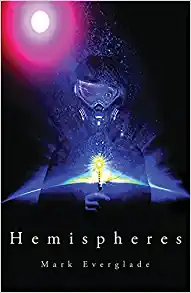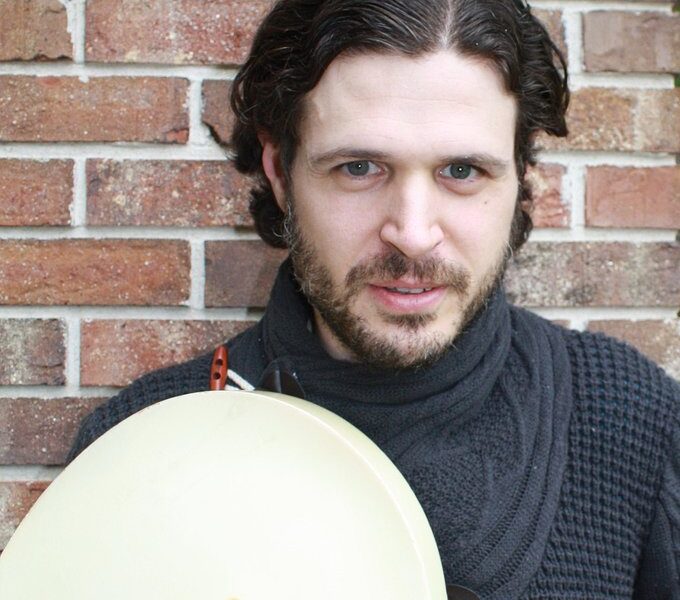Mark Everglade has spent his life studying social conflict. He runs the website www.markeverglade.com where he reviews cyberpunk media and interviews the legends. He also runs Cyberpunk Day each year with the Coalition to bring dystopian fiction to a new generation. His short stories have been featured beside authors such as Cory Doctorow and Walter Jon Williams.
FMM: You have spent your life studying social conflict. Share your background.
I hold a Master’s of Science in Sociology, which is the study of patterns of interactions between groups of people and the social institutions that manipulate them. Inequality has been one of my focus areas. Statistics like the following capture my attention: The lowest 80% of income earners in the United States this year have only made less than 12% of the nation’s income, while the vast majority of that income has been held by the top 1% of people. The Great Resignation has shown that people are distraught and will no longer support a system that is ignoring their basic needs, profiting off their suffering, and destroying the environment that supports us. So, I study these social movements and add fuel to their fire. With that said, the majority of my research has been on the meso, organizational level to support healthy workplaces.
FMM: What intrigued you about sci-fi at a young age and what is your perception now?
When I was young, I saw the starships and laser blasters and thought, “Wow, this is cool!” Once you go beyond Star Wars, however, you find that sci-fi can be a playground for visionaries to experiment with new family structures (Aldous Huxley’s Island), reimagine the education system (Neal Stephenson’s The Diamond Age), or even cognize the struggles a space-faring utopia might face (Iain M. Banks’ Culture series). This invigorates both my senses and my intellect.
FMM: Tell us about your dystopian cyberpunk novel, Hemispheres.
Hemispheres is a story told in vignettes through multiple characters who have aligned with opposing factions on the planet Gliese 581g. The premise is that the planet lacks daylight cycles, and that the poor are forced to live in darkness, thus inciting activists to increase the planet’s rotation to bring daylight to all. The groups of people, from cybernetic technophiles and government mercenaries, to mystics and lovers of nature, are as much characters as the people themselves. It combines elements of solarpunk, cyberpunk, and space opera in equal portions, and is known for its highly metaphorical, poetic prose, and philosophical musings.

FMM: “All great art is psychosis.” Explain
Most of our beliefs about reality were selected for based on their usefulness, or function. For instance, it’s beneficial to society for people to believe in an omniscient deity who can govern people behind closed doors to ensure they adhere to social standards of morality. With art, we have an opportunity to socially construct reality beyond mere function, that is, we can step outside the established framework of perception to see new worlds and new possibilities. That’s liberating, and is often transgressive, violating normal perspectives, and taking us into the realm of the psychotic. This brings art beyond the Platonic imitation of nature into what Seneca called, “a metaphysical supplement to the reality of nature.…”
Art also is a form of fantasy which unites subject and object, perceiver and perceived, as Lacan discussed, providing new modes of interpretation for social issues and other social facts. Now, not all art pushes the boundaries of social acceptance, but that should be the goal of any true artist – to expand the mind, and that’s what makes art great.
FMM: Cyberpunk has reacted against the mainstream science fiction. Tell us about your new anthology alongside cyberpunk legends Cory Doctorow and Walter Jon Williams.
The Shaper of Worlds anthology volume three is due later this year and will feature Sci-Fi and cyberpunk stories from many of the greatest authors out there. Edward Willet is producing it through Shadowpaw Press and has included a story I co-wrote a year ago with Dr. Joseph Hurtgen called Desert of the Real. People who love The Matrix or postmodern philosophy will see where from the titled was sourced.
The story is based on the Greco-Roman myth of Aurora and Tithonus (Timofey in the story). Aurora is a singer trying to support charity on a ruined planet, while Timofey is a ruthless intergalactic businessman who runs Immortality Inc, which owns the Immortality Machine, a device that promises those who work hard that they’ll live forever. Timofey becomes infatuated with Aurora and, as their relationship deepens, she discovers the truth about the machine and what the company’s been hiding to appease their stockholders. She must lead a group of orphans to shut it down in this story that’s basically a modern version of Kafka’s Penal Colony.
FMM: Tell us about your summer release Inertia and your upcoming novel, Song of Kitaba.
Song of Kitaba follows Kitaba Mahahara, a woman caught between two civilizations. In her tribal village, self-expression is illegal, and even drops of ink are rationed. In the City of Catonis, however, all people’s thoughts and deepest secrets are recorded on giant screens for government surveillance. So Kitaba tries to free and unite both civilizations, teaming up with cybermonks and rebels from every walk of life. The tone is heartfelt and lighter than most of my work.
Inertia is a solarpunk / cyberpunk work releasing this October about a world that’s spinning out of control, rotating faster every day, and threatening human life. Glaciers are melting, flooding entire cities, while the government profits off the destruction. A young geophysicist, Ash Rivenshear, seeks out who’s behind the crisis, but must solicit help from the man she’s avoided her whole life, legendary terraformer Severum Rivenshear, her father. The conflict is not only the environment collapsing, but the collapse of a family amidst the struggle as they try to rebuild the world, and their familial bonds, through envisioning a better tomorrow. Of course, there’s also a cyber-knight who’s a master hacker trying to stop them, swinging a sword that recalibrates their brain implants and crashes their pacemakers. That’s all in a day’s work for a cyberpunk author!
FMM: What is your proudest work to date?
Song of Kitaba is my proudest work because it’s my best writing while also being accessible to varying reading levels. The characters and their struggles really resonate with people. But my upcoming book, Inertia, is my best work from a creative point of view when examining the ideas. For instance, there’s a sentiment, crystalline species that extends through the planet, communicates with light, and merges into the internet in the final book.
FMM: You are known for reviewing cyberpunk media and interviewing the legends on your website, www.markeverglade.com. Tell us about your upcoming guests.
Those will be released soon as we finalize the details for Cyberpunk Day this November. The day is an annual, grassroots event recognizing, supporting, and promulgating the genre to the world, and features interviews with the biggest people in the genre, in addition to numerous events people can participate in revolving around table-top gaming, video gaming, music and art, and other media.
FMM: What’s next?
I’m working on the final book in the Hemispheres / Gliese trilogy, tentatively titled Tidal Pools. The novel will feature living cities, whereby the materials used to construct buildings will be organic and collectively conscious. What happens when a virus infects the physical infrastructure of a civilization? We’ll find out in a couple years!



